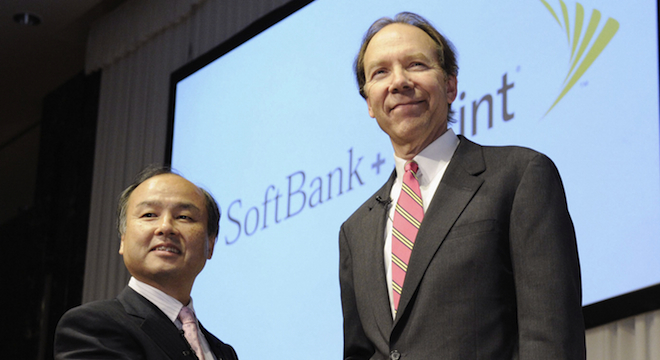Sprint, the nation’s third-largest wireless carrier by subscribers is selling a 70 percent controlling stake of the company to Japanese wireless giant SoftBank, the companies announced early Monday morning.
The terms of the deal haven’t fully been disclosed yet, but they will need to be made public and filed with the U.S. Securities and Exchange Commission and turned over to the Federal Communications Commission, the latter of which will get to decide to grant the necessary spectrum licensing transfer for the deal to proceed.
The U.S. Justice Department and/or the Federal Trade Commission must also greenlight the merger and could even file antitrust lawsuits against the deal if they believe there would be harm to competition, as was the case in August 2011 when the Justice Department sued to block a proposed merger between AT&T and T-Mobile, which the two companies later gave up on.
Sprint and SoftBank seem confident that their union will go through, though, saying in a press announcement Monday that they expected the deal to close by the middle of 2013.
If it does, the combined Sprint-SoftBank will become the world’s third largest wireless carrier with 96 million subscribers, behind only AT&T and Verizon, also the top two in the U.S.
Sources close to the situation told TPM under condition of anonymity that they expected the U.S. Justice Department to conduct a rare “single review” of the Sprint-Softbank deal terms.
Typically, the Justice Department will often issue a “second request” in the case of large mergers, asking for more documents than the companies initially provided. While this is a regular occurrence and doesn’t indicate any inclination on the Justice Department to block a merger, it does slow the completion of such deals down significantly.
As the Justice Department itself notes in its “Merger Review process initiative” circa 2001: “If it is determined that issuance of second requests is necessary, the Division staff will use the knowledge gained within the initial 15- or 30-day period to tailor the second requests as narrowly as possible to the transaction and the goals of the investigation.”
But a source close to the Sprint-SoftBank deal said that it was so legally watertight, they anticipated the Justice Department would not have to resort to a second review.
Still, there remains the issue of whether other competitors in the marketplace — namely AT&T, Verizon or T-Mobile — could raise objections to the deal.
As Philip Redman, an analyst with Gartner told ComputerWorld on Monday: “I’m sure both Verizon Wireless and AT&T will also have their say. AT&T may be looking for payback since Sprint was the main instigator when it came to blocking AT&T’s T-Mobile acquisition last year.”
Indeed, Sprint was the leading commercial objector to AT&T’s proposed $39 billion acquisition of T-Mobile, even filing its own antitrust lawsuit to block it from going through (though it was later joined by smaller wireless carrier C Spire Wireless).
But sources close to the situation told TPM that Sprint and Softbank weren’t worried about a revenge ploy on AT&T’s part either, noting that the AT&T-T-Mobile merger would have resulted in the consolidation of the U.S. wireless market from four major players to three, while the proposed Sprint and Softbank deal involves strengthening one of the four leading U.S. wireless companies, albeit via a takeover by a company from outside of the U.S.
That said, both Verizon and T-Mobile are also owned in some part by foreign companies (UK company Vodafone owns a 45 percent of Verizon while German company Deutsche Telekom owns all of T-Mobile USA, and T-Mobile just made a bid to merge with sixth-place national carrier MetroPCS), so it’s unlikely that they’ll rise in objection to the foreign ownership part of the proposed SoftBank-Sprint deal.






